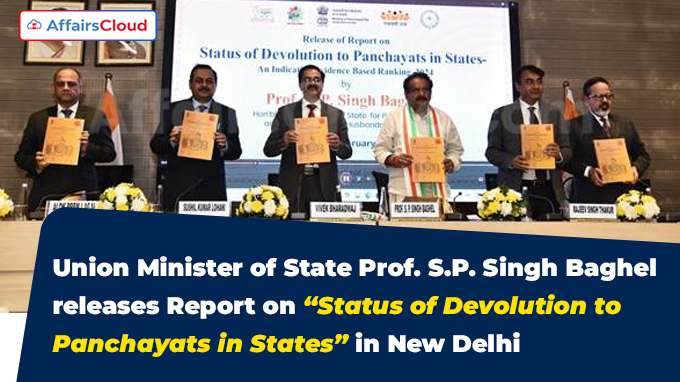 On February 13, 2025, Union Minister of State(MoS), S.P. Singh Baghel, Ministry of Panchayati Raj (MoPR), Ministry of Fisheries, Animal Husbandry and Dairying (MoFAH&D) released the comprehensive Devolution Index Report titled “Status of Devolution to Panchayats in States – An Indicative Evidence-Based Ranking 2024” at the Indian Institute of Public Administration (IIPA), New Delhi (Delhi).
On February 13, 2025, Union Minister of State(MoS), S.P. Singh Baghel, Ministry of Panchayati Raj (MoPR), Ministry of Fisheries, Animal Husbandry and Dairying (MoFAH&D) released the comprehensive Devolution Index Report titled “Status of Devolution to Panchayats in States – An Indicative Evidence-Based Ranking 2024” at the Indian Institute of Public Administration (IIPA), New Delhi (Delhi).
- As per the report, Karnataka ranked 1st in the devolution of power to panchayats, excelling in terms of funds, functions, and functionaries, followed by Kerala, Tamil Nadu (TN), Maharashtra, and Uttar Pradesh (UP).
- This report marks a key milestone in India’s efforts to empower Panchayati Raj Institutions (PRIs) and to fulfill the vision of “Local Self Government” outlined in the 73rd Constitutional Amendment.
Key People: The event was attended by Vivek Bharadwaj, Secretary of MoPR; Sushil Kumar Lohani, Additional Secretary of MoPR; Rajeev Singh Thakur, Advisor at National Institution for Transforming India (NITI) Aayog; Alok Prem Nagar, Joint Secretary of MoPR.
What is the Devolution Index?
i.The Devolution Index is the result of thorough research and empirical analysis, offering insights into decentralization progress across States and UTs.
- The report was prepared by the IIPA and assessed 31 states and Union Territories (UTs), sampling 172 Panchayats across 68 districts, with a total of 1,594 respondents interviewed.
- Meghalaya, Mizoram, Nagaland, UT of Chandigarh and National Capital Territory(NCT) of Delhi are not covered in this report.
ii.The Index evaluates 6 critical dimensions: Framework, Functions, Finances, Functionaries, Capacity Building, and Accountability of Panchayats.
iii.It specifically examines the autonomy of Panchayats to make and implement independent decisions, reflecting the spirit of Article 243G of the Constitution.
Note: Article 243G empowers State legislatures to devolve powers and responsibilities to Panchayats across 29 subjects listed in the 11th Schedule.
Significance of the Devolution Index:
i.The Devolution Index serves as a tool for strengthening cooperative federalism and local self-governance.
ii.It enables states to identify areas for improvement and adopt best practices for more empowered and effective Panchayats.
iii.For citizens, it provides transparency in tracking Panchayat functioning and resource allocation, while elected representatives can utilize data-driven insights for advocacy and reform.
Key Highlights of the Report:
i.Increase in Devolution: The report indicates a rise in devolution to rural local bodies from 39.9% in 2013-14 to 43.9% in 2021-22.
- Financial Devolution: The share of funds allocated to PRIs increased from 32.05% to 37.04%, enhancing financial resources for local governance.
- Functional Devolution: The proportion of functions transferred to PRIs declined from 35.34% to 29.18%, indicating a reduction in administrative responsibilities at the local level.
ii.Capacity Enhancement: Following the launch of the Rashtriya Gram Swaraj Abhiyan (RGSA) on April 21, 2018, the capacity enhancement component of the Devolution Index 2024 increased from 44% to 54.6%, marking an improvement of over 10%.
iii.Functionaries: Efforts to strengthen PRIs through infrastructure development and recruitment have led to a significant increase in the functionaries component of the Devolution Index, rising from 39.6% to 50.9%.
iv.Accountability & Transparency: Measures to enhance accountability and transparency resulted in scores growing from 46.1% to 47.5%, indicating stronger auditing and anti-corruption efforts.
Leading States based on 6 Dimensions:
i.Kerala leads in the ‘Framework’ dimension, setting the standard for mandatory structures.
ii.Tamil Nadu (TN) excels in ‘Functions’, establishing a benchmark for functional devolution.
iii.Karnataka demonstrates exemplary financial management in the ‘Finances’ category.
iv.Gujarat leads in ‘Functionaries’, showcasing excellence in personnel management and capacity building.
v.Telangana stands out in ‘Capacity Enhancement’, leading in institutional strengthening.
vi.Karnataka also sets new standards in ‘Accountability’, establishing benchmarks in transparency.
Top 5 States in Devolution Index (DI Score > 55):
| Rank | State | Score |
|---|---|---|
| 1 | Karnataka | 72.23 |
| 2 | Kerala | 70.59 |
| 3 | Tamil Nadu (TN) | 68.38 |
| 4 | Maharashtra | 61.44 |
| 5 | Uttar Pradesh (UP) | 60.07 |
Key points:
i.States namely Tripura (57.58), Rajasthan (56.67), West Bengal (WB) (56.52), Chhattisgarh (56.26) have scored above 55.
ii.States scored between 50 and 55, includes Telangana (55.1), Andhra Pradesh (AP) (54.43), Himachal Pradesh (HP) (53.17), Madhya Pradesh (MP) (50.94), and Odisha (50.03) are categorized as ‘medium scoring States’, reflecting commendable performance across all sub-indicators.
iii.Bihar (48.24) along with the northeastern and hilly states of Assam (49.06), Sikkim (43.91), and Uttarakhand (49.11) emerged as moderate scorers but with values above the national average of 43.89.
iv.States and UTs which have scored low are Goa (37.71), Haryana (39.33), Jharkhand (27.73) and Punjab (29.34).
v.UP has made a remarkable improvement, advancing from 15th to 5th position, attributed to its enhanced accountability framework and anti-corruption measures.
vi.Tripura‘s impressive leap from 13th to 7th place, particularly in revenue generation and fiscal management, demonstrates, even smaller states are equally capable of achieving excellence in local governance.
About Indian Institute of Public Administration (IIPA):
President – Jagdeep Dhankhar(Vice President of India)
Headquarters – New Delhi, Delhi
Established – 1954




